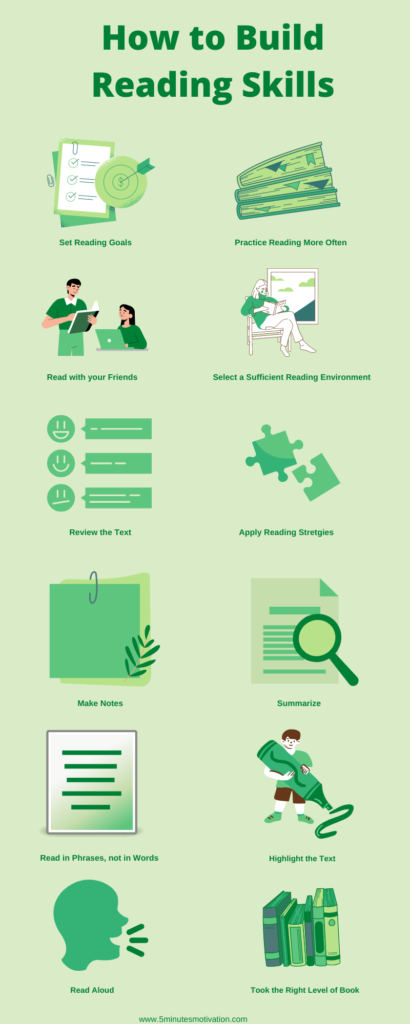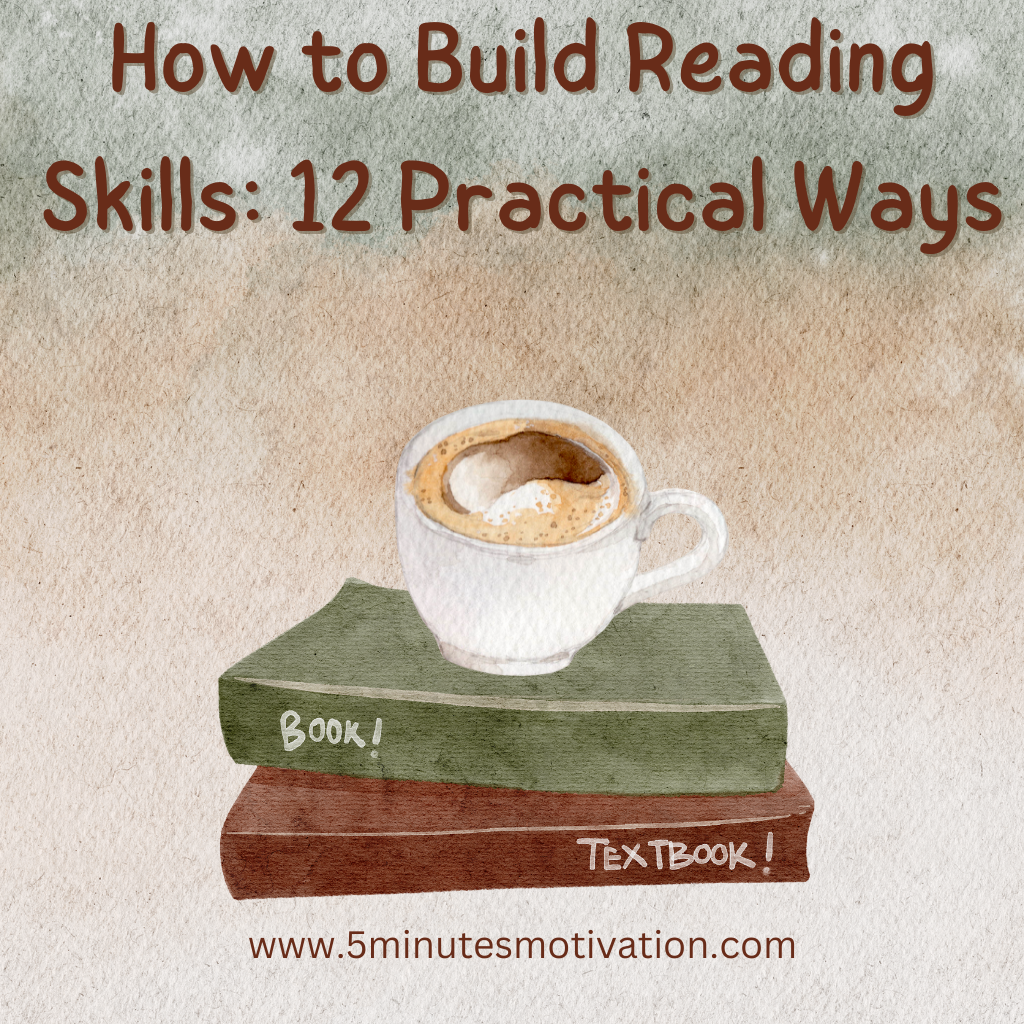Reading skills are the abilities and a person’s capacity to read, comprehend, interpret, and decode written language and texts. It is the ability to interact with a text and take in words.
Several vital aspects work together to build reading skills. The advice is to develop these skills at an early age in schooling. But most adults have no or weak reading skills that make them struggle in reading, general or academic.
Significance of Reading Skills
Reading skills allow you to read the text fascinatingly and not get bored.
Exceptional reading skills can be highly beneficial to assimilating and responding to written communication like emails, letters, and other written messages. Reading skills also help in the workplace for effective written communication, leading to less misunderstanding expectations.
These skills also encompass various essential abilities that develop the overall literary skills, which include comprehension, fl; fluency, vocabulary, speed reading, and strategies that help the reader decode the meaning of the text.
Types of Reading Skills
Various reading skills contribute together to bring better results in reading well, understanding, and getting benefits from it.
1: Comprehension
Comprehension is the ability to understand the meaning of the text. It gets complicated when reading a literary classic or a heavy book. Comprehension involves:
- Interpreting the importance of the text.
- Decoding the meaning of unfamiliar words.
- Identifying the critical features of the text.
There are several ways to increase your comprehension:
- Improve vocabulary.
- Use context clues.
- Write a summary of the text.
- Avoid distractions.
2: Cohesion and Coherence
Cohesion is the ability to link one sentence with the other. Coherence is the ability to connect one idea to the other in a large piece of writing. Cohesion and Coherence help to increase fluency and comprehension. It allows you to quickly and thoroughly understand the meaning of a text.
Some types can increase cohesion and coherence
- Focus on only one main idea from a paragraph.
- Come up with your concept with proper explanation, evidence, and experience.
- Use numerous linking words and phrases.
3: Decoding
Decoding is the ability to sound out words you have heard but never seen written, to hear individual sounds in comments, and to connect those sounds to terms. It is a phonemic awareness of joining a letter or group of letters, the sounds they make, and sounding out or decoding words.
- Get exposed to books, songs, and stories.
- Start with common words.
- Reinforce the use of meaning clues to self-monitor and confirm.
4: Fluency
Fluency is the ability to read clearly with the flow, decode vocabulary quickly while reading, and understand text fast. It is the combination of many factors that speeds up the reading process but not compromising comprehension. An average reader needs to see a word 14 times before it becomes a sight word and a person with dyslexia needs it 40 times.
Fluency is an essential reading skill to speed up reading. It reduces the pauses during reading and enables you to group words.
- Practice reading regularly.
- Expanding vocabulary as word recognition is one of the biggest obstacles to fluency.
- Listen to podcasts, songs, and audiobooks to learn.
- Copy a native speaker.
5: Vocabulary
Vocabulary is an essential factor in reading comprehension. Understanding the meaning of words, decoding unfamiliar words, and literary understanding features are all various aspects of vocabulary.
- Make a conscious effort to increase your vocabulary.
- Read various types of genes, like science, classics, poetry, and self-help books, to get introduced to new terms.
- Use word games and flashcards to make learning enjoyable.
6: Retention
Reading comprehension is based on retention. Retention is the ability to remember the information from reading text. One of the best practices for retention is summarizing and note-taking. Following are some ways to improve retention:
- Focus your attention.
- Visualize the concepts.
- Make charts and tables of the text.
- Read out aloud.
Ways to Master Reading Skills

1: Set reading goals.
Setting reading goals is essential because it pushes you to read every day. Reading continues is the only best way to improve your reading skills. You can set a goal like reading 15 pages a day, 30 minutes a day, or a book weekly. You may also keep a goal of learning vocabulary that interests you or comprehending a literary classic.
Reading goals aim to get out of your comfort zone and push yourself to make a slight improvement every day.
2: Preview the text you read.
Before starting reading, previewing the entire text can help you better understand the purpose of the content. If you are reading a book, you have to skim and preview the book by looking at the chapters, headings, subheadings, first and last paragraphs, etc., to get an idea of what you are reading. Preview helps you to guess the central idea and main themes of the text you begin to read.
3: Use reading strategies.
Reading strategies are proven ways that increase reading skills. Several reading strategies will help you better understand the theme, read speedily, and comprehend well. You might skim the content to find important content or preview it before starting to read.
Reading strategies like identifying text features, determining the theme, and understanding the context contribute to making you a pro reader.
- Skimming is how to quickly overview the entire text and identify what you will read. The reader looks at headings, subheadings, paragraphs, and sections to grasp the main idea and themes of the text.
- Scanning is a quick look at the text to find detailed information, dates, or a name. The reader quickly scans the text and finds the required information.
- Intensive reading aims for accuracy and consumes a lot of time. It seeks to understand the text in detail thoroughly. It requires more reader attention as it focuses on every word. In academic readings, intensive reading is necessary.
- Extensive reading focuses more on fluency and less on accuracy. It is applied in general reading and used for reading for pleasure.
4: Make predictions.
While reading, try to think about the story and come up with your own versions of events and ideas. Make predictions about what will happen next. This helps very well in comprehension as well as boosts interest to read even more.
5: Take notes while you read.
You are taking notes while reading is another effective way to improve reading skills. You may take notes to understand the author’s choice of language, link clues, point to new vocabulary, and record confusion in your mind regarding the content.
You may also make visuals, charts, tables, or diagrams to organize better and deeply understand the content. It lets you point out the rich text’s themes and leading lessons. Note-taking is also very beneficial for summarizing too.
6: Make a summary.
Summarizing the text improves reading skills by forcing you to remember specific details, events, and themes, then relate them and find a conclusion. It forces you to conclude your unique perspective and understanding of the text.
You may verbally summarize the text. But writing helps a lot. Written summaries are the short but comprehensive versions of the text you read so you can re-read it again and again in less time.
Conclusion
These skills also encompass various essential abilities that develop the overall literary skills, which include comprehension, fl; fluency, vocabulary, speed reading, and strategies that help the reader decode the meaning of the text.
Reading skills is the ability to understand the text in the best possible way. These skills are critical to learning as they promise high returns while reading in general and in academics. Reading skills involve comprehension, cohesion, decoding, fluency, and vocabulary. You may improve your reading skills by following simple steps.
Do you like this article? What type of reading skills do you want to upgrade? What reading skills-improving tip did you find beneficial for you? Let me know in the comments.

